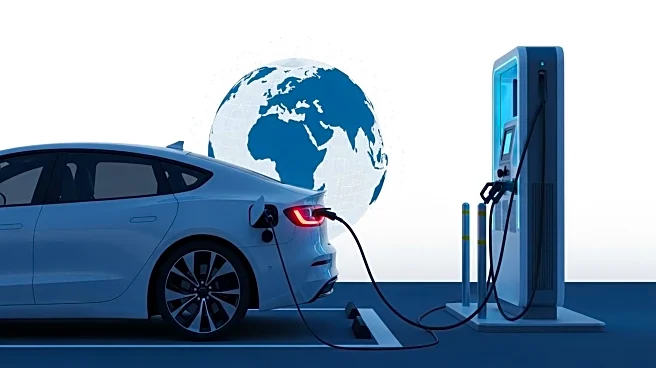What's Happening?
Maruti Suzuki India Limited has commenced the export of its first Battery Electric Vehicle (BEV), the e Vitara, to Europe. In August, over 2,900 units were shipped from Pipavav Port in Gujarat to 12 European countries, including the United Kingdom, Germany, and France. This development follows a significant event at Maruti Suzuki's manufacturing facility in Hansalpur, Gujarat, where Indian Prime Minister Narendra Modi recognized the company as a brand ambassador for the 'Make in India' initiative. The e Vitara, built on the new HEARTECT-e platform, is designed to offer advanced technology and performance, aiming to delight customers across Europe.
Why It's Important?
The export of the e Vitara marks a pivotal moment for Maruti Suzuki and India's automotive industry, as it positions India as a global hub for electric vehicle production. This move aligns with India's broader economic strategy to boost manufacturing and exports under the 'Make in India' initiative. For Maruti Suzuki, entering the European market with an electric vehicle represents a strategic expansion into a region with growing demand for sustainable transportation solutions. The success of this venture could enhance India's reputation in the global automotive sector and potentially lead to increased foreign investment and job creation in the country.
What's Next?
Maruti Suzuki plans to expand the export of the e Vitara to over 100 countries, alongside its domestic market launch. The company's focus will likely be on scaling production to meet international demand while maintaining high standards of technology, design, and safety. As the e Vitara gains traction in Europe, Maruti Suzuki may explore further innovations in electric vehicle technology to strengthen its competitive edge. Additionally, the company's success could encourage other Indian manufacturers to increase their participation in the global electric vehicle market.
Beyond the Headlines
The export of the e Vitara underscores the potential for India to become a leader in sustainable automotive manufacturing. This development may prompt discussions on the environmental impact of increased electric vehicle production and the need for supporting infrastructure, such as charging stations. Furthermore, it highlights the importance of international collaboration in advancing green technology and reducing carbon emissions globally.










